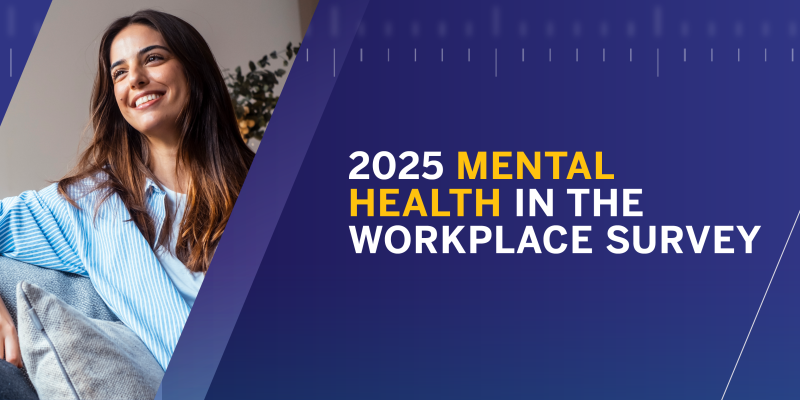
Supporting mental health amongst U.S. workers is essential to building a thriving workplace. That’s why Inmar Intelligence is focused on open dialogue, flexibility, and consistent support for associate well-being.
Understanding Current Mental Health in the Workplace
Mental health in the workplace is constantly evolving. Recent insights from our 2025 Mental Health In the Workplace Survey* reveals a split experience—some workers have adapted, while others continue to navigate uncertainty:
- 37% of workers reporting improvements in mental health post-COVID
- 27% noting a decline in mental health post-COVID
External pressures, like economic volatility and political tension, have remained consistent stressors for the past five years, compounding the emotional load many employees carry. Employers must respond with empathy and awareness, because those pressures don’t disappear at the office door.
The Role of Jobs in Mental Health Outcomes - For Better or Worse
Work can either fuel well-being or become a source of strain:
- 34% of respondents say their job positively impacts their mental health
- 33% of respondents reported a negative impact
This near-even split reinforces the importance of thoughtful leadership and inclusive workplace design to support the full spectrum of employee needs. What’s more, millennials stand out as a “sandwich generation” when it comes to mental health. They are the only generation in our survey to report an overall decline in mental health since the pandemic, likely reflecting the dual pressures of caregiving, career progression, and financial uncertainty, all while often managing up and mentoring younger colleagues.
Key Factors Impacting Mental Health Amongst U.S. Workers
Key factors that positively impact mental health at work include**:
- Job security (45%)
- Reasonable workload (40%)
- Supportive management (40%)
- Flexible work options (39%)
- Healthy work culture (38%)
On the other hand, key negative drivers include**:
- Poor communication (32%)
- Excessive or unclear workload (30%)
- Toxic or stressful culture (29%)
- Lack of recognition (25%)
- Unsupportive management (24%)
These insights reinforce that mental health and job conditions are deeply intertwined, and improving communication, clarity, and leadership support can drive measurable change.
Mental Health and Workplace Safety
While mental health awareness is growing, stigma still lingers. In the survey, only 32% of respondents indicated they feel completely safe discussing mental health at work, and 39% feel only slightly or not at all safe. Psychological safety must be built with intention and consistency.
At Inmar, we’re continuing to break down stigma and foster a culture where vulnerability is respected, conversations are supported, and mental health is treated as a vital part of overall well-being.
Empowering Employees Through Accessible Mental Health Resources
When it comes to benefits, mental health amongst U.S. workers thrives where there's access, transparency, and variety.
Only 25% of respondents say they have access to licensed therapy, and 40% are aware of an Employee Assistance Program (EAP). Meanwhile, top-requested benefits include flexibility (41%), stress management (30%), wellness apps (27%), and therapy access (26%).
Workplace Flexibility is a Multi-Generational Mandate
While more than 60% of employees work fully or mostly in-office, only 42% prefer it, revealing a clear gap between policy and preference. This underscores the growing need for flexible work models that support both performance and well-being.
With four generations in the workforce, flexibility isn’t a perk, it’s essential. Preferences vary by life stage, and a one-size-fits-all model no longer works. And this isn't just about preference, it is about mental well-being. While 59% of employees say their current work setup supports their mental health, 17% say it negatively affects it. Flexibility, when offered with intention, isn’t just a benefit, it’s a driver of engagement, retention, and psychological safety across generations.
Leading the Way on Mental Health in the Workplace
Only 21% of respondents say their leadership sets a strong example.
The leadership team at Inmar is working to close that gap by creating environments where associates feel safe, supported, and empowered. We provide programs like Lyra - which provides access to Therapy & Coaching, Complex Care Preventive and Self Care tools - as well as EAPs, flexible work arrangements and more.
If you want to be part of a workplace that puts mental health in the workplace first, explore our open careers.
*2025 Mental Health In the Workplace Survey fielded 5/12/25 included 1,000 US respondents who hold a full or part-time job.
**Multiple-choice selection
WATCH NOW AS SPENCER BAIRD REFLECTS ON MENTAL HEALTH AND INMAR’S COMMITMENT TO ASSOCIATE WELL BEING
What can we help you achieve?
Share some contact information, and we'll reach out to discuss your goals — and how to reach them.
